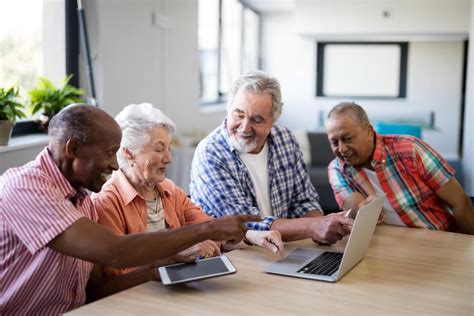Assisted living facilities are designed to provide a supportive environment for seniors who require assistance with daily activities, such as bathing, dressing, and medication management. Medical technology, also known as med tech, has revolutionized the way assisted living facilities operate, enhancing the quality of care and improving the lives of residents.

The integration of med tech in assisted living facilities has numerous benefits, including improved safety, increased efficiency, and enhanced resident engagement. Here are seven ways med tech enhances assisted living:
1. Remote Health Monitoring
Remote health monitoring systems enable caregivers to track residents' vital signs, such as blood pressure, temperature, and oxygen levels, remotely. This allows for early detection of potential health issues, enabling prompt interventions and reducing the risk of hospitalization.

Benefits of Remote Health Monitoring
- Early detection of health issues
- Reduced risk of hospitalization
- Improved resident safety
- Enhanced caregiver efficiency
2. Medication Management Systems
Medication management systems are designed to ensure that residents receive their medications on time and in the correct dosage. These systems use automated dispensers and alerts to remind caregivers when medications are due, reducing the risk of medication errors.

Benefits of Medication Management Systems
- Reduced risk of medication errors
- Improved resident safety
- Enhanced caregiver efficiency
- Increased resident independence
3. Electronic Health Records (EHRs)
Electronic Health Records (EHRs) are digital versions of residents' medical records, containing their medical history, medications, and treatment plans. EHRs enable caregivers to access residents' medical information quickly and easily, improving the quality of care.

Benefits of EHRs
- Improved access to medical information
- Enhanced caregiver efficiency
- Reduced risk of medical errors
- Increased resident safety
4. Fall Detection Systems
Fall detection systems use sensors and wearable devices to detect when residents have fallen, enabling caregivers to respond promptly and provide assistance.

Benefits of Fall Detection Systems
- Reduced risk of injury
- Improved resident safety
- Enhanced caregiver efficiency
- Increased resident independence
5. Virtual Reality Therapy
Virtual reality (VR) therapy is a form of therapy that uses immersive, interactive environments to help residents manage stress, anxiety, and other mental health conditions.

Benefits of Virtual Reality Therapy
- Reduced stress and anxiety
- Improved mood
- Enhanced resident engagement
- Increased resident independence
6. Telehealth Services
Telehealth services enable residents to consult with healthcare professionals remotely, reducing the need for in-person visits and improving access to medical care.

Benefits of Telehealth Services
- Improved access to medical care
- Reduced risk of hospitalization
- Enhanced caregiver efficiency
- Increased resident independence
7. Resident Engagement Platforms
Resident engagement platforms use digital technologies, such as tablets and smartphones, to provide residents with access to entertainment, education, and social activities.

Benefits of Resident Engagement Platforms
- Improved resident engagement
- Enhanced resident satisfaction
- Increased resident independence
- Reduced risk of depression and anxiety
In conclusion, med tech has revolutionized the way assisted living facilities operate, enhancing the quality of care and improving the lives of residents. By leveraging these technologies, caregivers can improve resident safety, increase efficiency, and enhance resident engagement.





What is med tech in assisted living?
+Med tech in assisted living refers to the use of medical technology to enhance the quality of care and improve the lives of residents.
How does remote health monitoring work?
+Remote health monitoring systems use sensors and wearable devices to track residents' vital signs and detect potential health issues.
What are the benefits of telehealth services?
+Telehealth services provide residents with access to medical care remotely, reducing the need for in-person visits and improving access to medical care.
